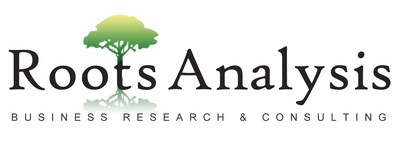LONDON, Aug. 28, 2019 /PRNewswire/ --Roots Analysis has announced the addition of "CAR-T Therapies Market (2nd Edition), 2019-2030" report to its list of offerings.

Encouraging clinical results reported across several completed and ongoing trials, coupled to lucrative financing, have inspired many biopharmaceutical developers and academic research groups to focus their efforts on this relatively novel class of immunotherapies. With two approved products, CAR-T cell therapies are presently considered among the most promising therapeutic interventions available. Several pipeline candidates have recently entered mid to late-stage (phase II and above) trials and are anticipated to enter the market over the next 5-10 years.
To order this 580+ page report, which features 130+ figures and 270+ tables, please visit this link
Key Market Insights
Close to 500 CAR-T cell therapy candidates are in the development pipeline
Over 100 companies and 85 academic / research institutes are actively involved in this domain. It is worth highlighting that 66% of the pipeline therapies are presently in the clinical stage. Examples of late-stage clinical candidates include bb2121 (bluebird bio / Celegene), JCAR017 (Celgene / Juno Therapeutics / WuXi AppTec), EPCAM CAR-T (Sinobioway Cell Therapy), MB-CART19.1 (Miltenyi Biotec / Shanghai Children's Medical Center) and LCAR-B38M CAR-T (Nanjing Legend Biotech / Janssen).
Currently, the focus is on hematological malignancies and solid tumor indications
More than 95% of the products in the pipeline are being developed to treat various types of cancers, including (in decreasing order of number of pipeline products) acute lymphoblastic leukemia, non-Hodgkin's lymphoma, multiple myeloma and chronic lymphocytic leukemia. Only 2% of such therapies are being evaluated for the treatment of non-oncological indications.
Extensive efforts are underway to improve CAR constructs
Majority of the CAR-T cell therapies in the clinical pipeline, including the two approved drug products, are based on second generation CARs. Therapy candidates based on the fourth generation of CARs are under development, currently representing 15% of the overall pipeline.
China is leading the product development efforts related to CAR-T cell therapies, in terms of number of active trials and supporting hospitals
In the last 10 years, over 410 clinical trials, evaluating various types of CAR-T cell therapies, were registered across different geographies; interestingly, over 50% of these trials are being conducted in China.
North America and Europe anticipated to capture over 75% of the market share by 2030
North America and Europe are the current hubs of R&D and sales activity and are likely to continue to dominate the market over the next decade. However, owing to the fact that more than 60% of the CAR-T trials are currently being conducted in China, this market is likely to grow at a relatively faster rate, compared to developed regions.
To request a sample copy / brochure of this report, please visit this link
Key Questions Answered
- Who are the leading industry and non-industry players in this market?
- What kind of clinical conditions can be treated using CAR-T cell therapies?
- What are the prevalent R&D trends related to CAR-T cell therapies?
- Which are the key / emerging CMOs, in different regions, that you can reach out to for your CAR-T cell therapy manufacturing requirements?
- Who are the key opinion leaders / experts in this field, who can help drive your CAR-T cell therapy development efforts?
- How is the current and future market opportunity likely to be distributed across key market segments?
- What are the key factors that are likely to influence the evolution of the CAR-T cell therapy market?
- What are the key promotional strategies that are likely to be adopted for CAR-T cell therapy products that are approved and commercialized in the near future?
- What are the key challenges faced by CAR-T cell therapy developers?
The USD 11 billion (by 2030) financial opportunity within the CAR-T cell therapy market has been analyzed across the following segments:
- Disease indication
- Acute lymphoblastic leukemia
- Multiple myeloma
- Chronic lymphocytic leukemia
- Non-Hodgkin lymphoma
- Hepatocellular carcinoma
- Colorectal cancer
- Target antigens
- CD19
- BCMA
- GPC3
- EGFR
- Key geographical regions
- North America
- Europe
- Asia Pacific
The report features inputs from eminent industry stakeholders, according to whom T-cell immunotherapies are expected to be the next big thing in cancer immunotherapy. The report includes detailed transcripts of discussions held with the following experts:
- Tim Oldham (Chief Executive Officer, Cell Therapies)
- Troels Jordansen (Chief Executive Officer, Glycostem Therapeutics)
- Wei (William) Cao (Co-Founder, Chairman and Chief Executive Officer, Gracell Biotechnologies)
- Miguel Forte (Chief Operating Officer, TxCell)
- Adrian Bot (Vice President, Scientific Affairs, Kite Pharma)
- Vincent Brichard (Vice President, Immuno-Oncology, Celyad)
- Brian Dattilo (Manager of Business Development, Waisman Biomanufacturing)
- Aino Kalervo (Competitive Intelligence Manager, Strategy & Business Development, Theravectys)
- Xian-Bao Zhan (Professor of Medicine and Director, Department of Oncology, Changhai Hospital)
- Enkhtsetseg Purev (Assistant Professor of Medicine, University of Colorado)
The research covers brief profiles, featuring an overview of the company, its financial information (if available), and a description of its product(s), highlighting type of therapy and current development status. Each company profile includes technology portfolio (if available), recent developments related to T-cell immunotherapies and manufacturing capabilities of the companies.
- Autolus
- bluebird bio
- CARsgen Therapeutics
- Celgene
- Cell Medica
- Cellectis
- Cellular Biomedicine Group
- Innovative Cellular Therapeutics
- Kite Pharma
- Noile-Immune Biotech
- Novartis
- Shanghai GeneChem
- Sinobioway Cell Therapy
- Takara Bio
- Ziopharm Oncology
For additional details, please visit
https://www.rootsanalysis.com/reports/view_document/car-t-therapies-market-2nd-edition-2019-2030/269.html or email sales@rootsanalysis.com
You may also be interested in the following titles:
- Global T-Cell (CAR-T, TCR, and TIL) Therapy Market (4th Edition), 2019 - 2030
- Gene Therapy Market (3rd Edition), 2019 - 2030
- Antibody Drug Conjugates Market (5th Edition), 2019-2030
- Synthetic Lethality-based Drugs and Targets Market, 2019-2030: Focus on DNA Repair (including PARP Inhibitors) and Other Novel Cellular Pathways
Contact:
Gaurav Chaudhary
+1 (415) 800 3415
Gaurav.Chaudhary@rootsanalysis.com

